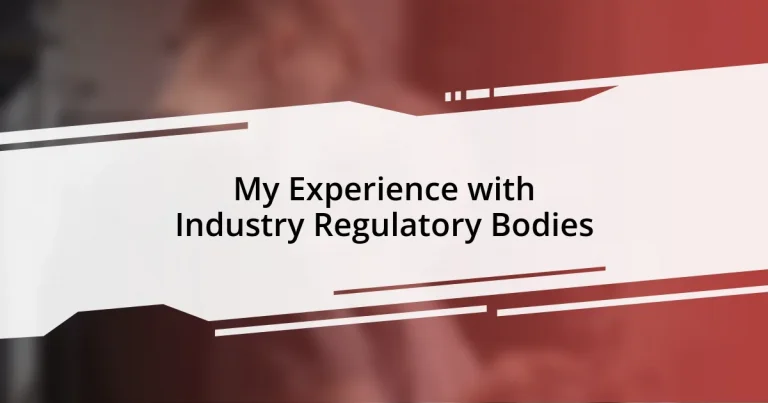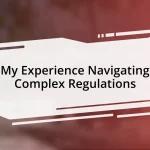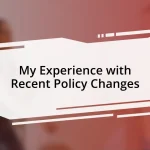Key takeaways:
- Industry regulatory bodies serve as both enforcers and guides, striving to balance regulation with innovation and consumer protection.
- Compliance fosters trust and accountability, transforming client relationships and contributing to long-term success.
- Successful navigation of regulatory frameworks requires continuous learning, strong relationships, and proactive measures to adapt to changes.
- Engaging with regulators leads to enhanced clarity on compliance obligations and offers valuable networking opportunities, alleviating stress in critical situations.
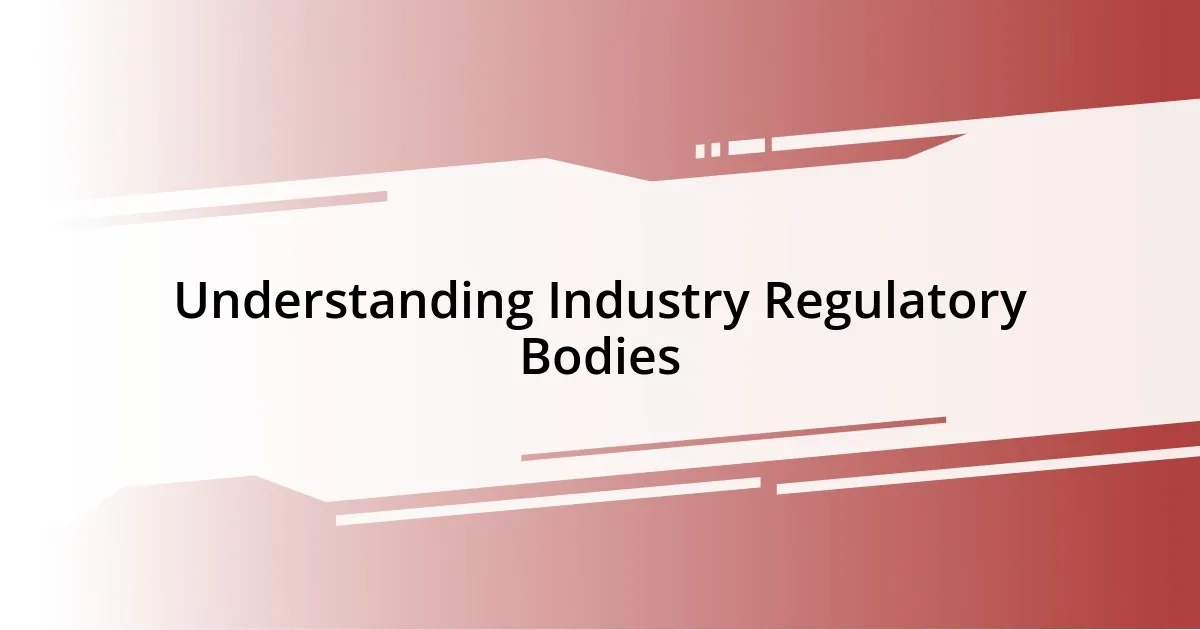
Understanding Industry Regulatory Bodies
Industry regulatory bodies play a crucial role in overseeing practices within specific sectors, ensuring that operations adhere to established standards. I remember my first encounter with a regulatory body during a compliance audit; the atmosphere was tense but enlightening. It struck me how these organizations function not just as enforcers, but as guides that aim to protect both consumers and businesses.
As I delved deeper into the workings of these bodies, I realized they often face a balancing act. They must enforce regulations while fostering an environment that doesn’t stifle innovation. Have you ever wondered how they manage to keep up with rapid advancements in technology? In my experience, they typically rely on industry experts who help shape their policies, ensuring relevance and effectiveness.
This relationship between regulatory bodies and the industries they oversee is not just professional; it’s deeply personal for many involved. I’ve seen professionals who truly care about the implications of their decisions on public safety and ethics. Isn’t it fascinating how the work done behind the scenes can impact lives on such a large scale? It reminds us that regulatory bodies are not just faceless institutions; they are made up of dedicated individuals striving to make a difference.
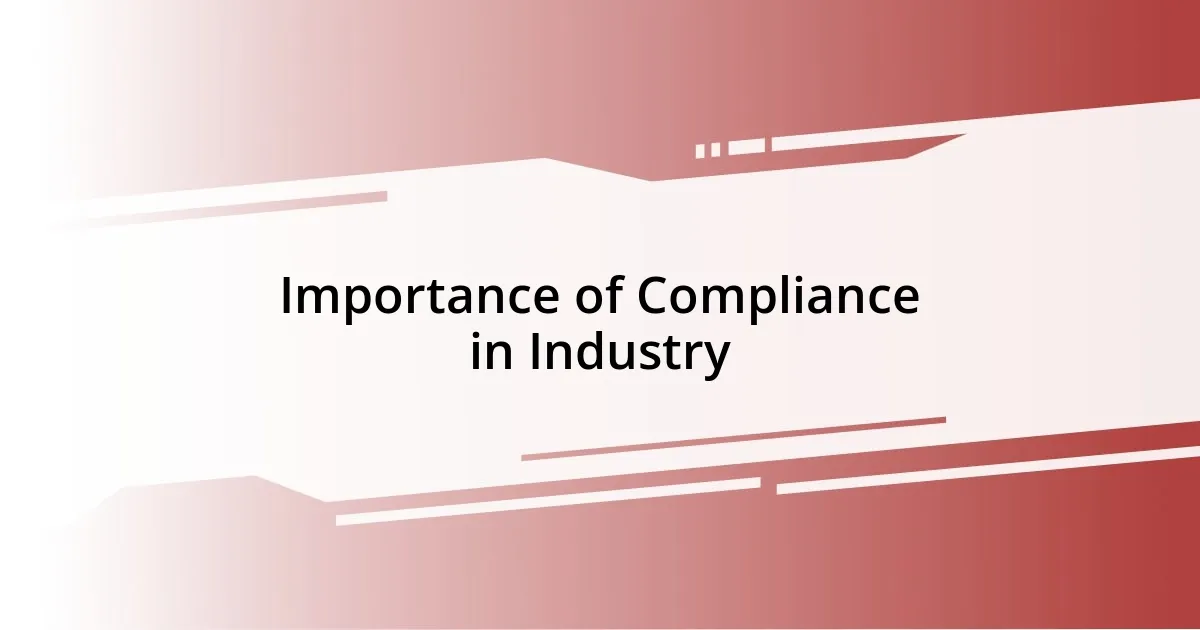
Importance of Compliance in Industry
Compliance in industry is not just a legal obligation; it’s a foundation for building trust. I recall a project I worked on where adherence to regulations turned a skeptical client into a staunch advocate for our services. By demonstrating our commitment to compliant practices, we not only secured their business but also established a rapport that led to numerous referrals. This experience showed me firsthand how compliance can transform relationships.
When organizations prioritize compliance, they create a culture of accountability and integrity. I’ve watched teams blossom when they realize that following regulations isn’t simply about avoiding penalties; it’s about fostering a safe environment for both employees and customers. It feels rewarding to know that our actions contribute positively to the industry landscape, and I can’t stress enough how compliance becomes a shared value that resonates through every level of an organization.
Moreover, the risks of non-compliance can be severe, leading to fines and reputational damage. In my early career, I witnessed a company navigating a compliance crisis that nearly derailed their operations. This experience taught me that compliance isn’t just about avoiding consequences; it’s about sustaining long-term success. When businesses embrace compliance, they position themselves not only as responsible industry players but also as leaders who prioritize ethical practices and foster innovation.
| Aspect | Compliance |
|---|---|
| Trust Building | Enhances relationships with clients |
| Cultural Impact | Fosters accountability among teams |
| Risk Management | Avoids costly penalties and crises |
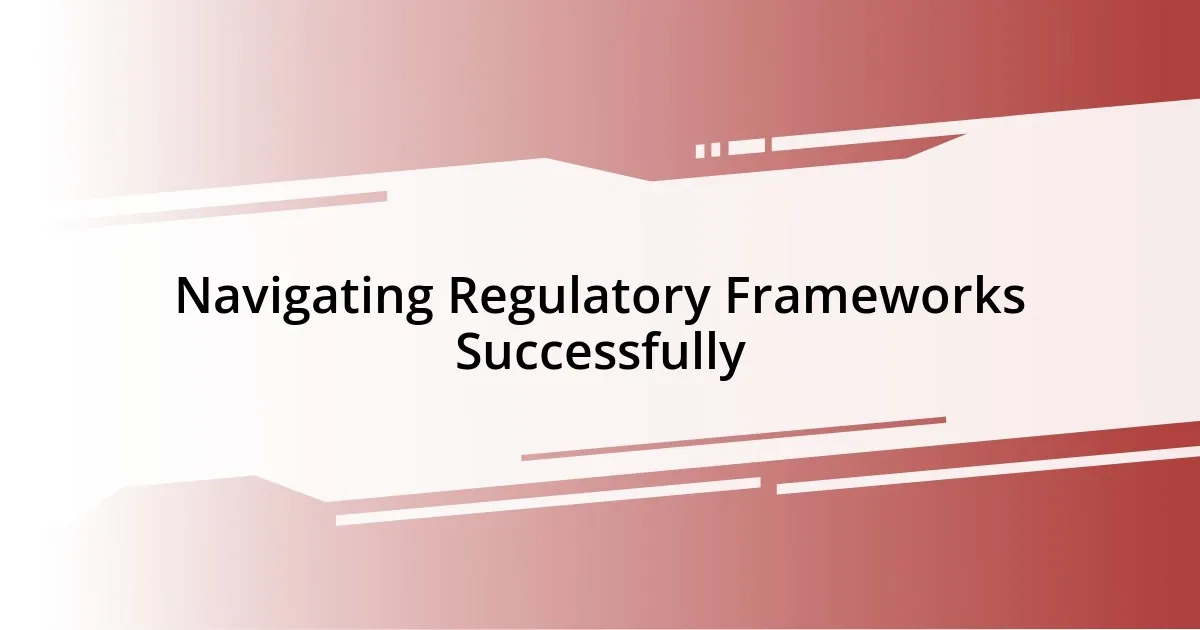
Navigating Regulatory Frameworks Successfully
Successfully navigating regulatory frameworks can feel daunting, but I’ve learned that it’s all about building a robust understanding of the rules and developing strong relationships. I remember a particularly challenging project where I had to interpret complex regulations impacting our operations. Instead of viewing it as an obstacle, I saw it as an opportunity to engage with regulatory experts. Their insights not only clarified the requirements but also fostered collaboration that enhanced our compliance strategies.
- Embrace continuous learning: Stay updated on changes in regulations through workshops or webinars.
- Foster open communication: Build relationships with regulatory contacts; they’re invaluable resources.
- Document everything: Maintain thorough records of compliance efforts to simplify audits and reporting.
- Implement proactive measures: Anticipate regulatory changes; prepare your team to adapt quickly.
- Share experiences: Create an internal forum for discussing challenges in meeting regulatory requirements; collective insights can lead to innovative solutions.
In my experience, this combination of knowledge and collaboration can turn the regulatory maze into a manageable pathway toward success.
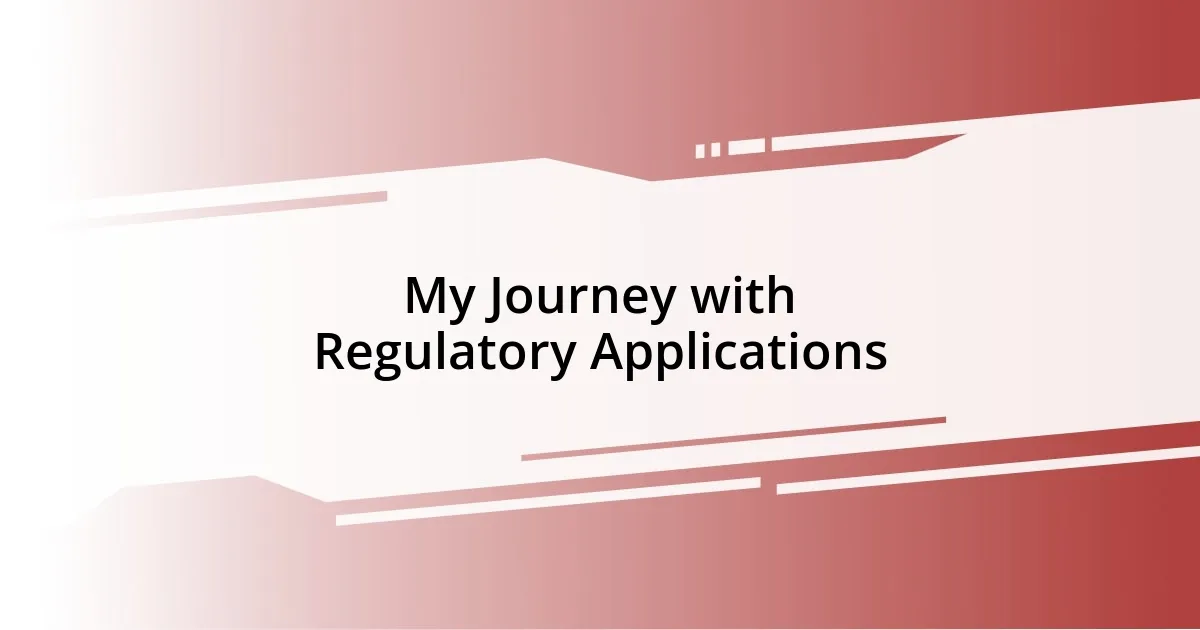
My Journey with Regulatory Applications
Navigating through the maze of regulatory applications has been a journey filled with both challenges and revelations. I remember sitting at my desk for hours, dissecting multifaceted application forms that felt like a labyrinth of red tape. It was frustrating at times, but reflecting on those moments, I realized how essential a meticulous approach is. Isn’t it amazing how every detail could make or break a submission? I learned to embrace the meticulousness, which ultimately transformed daunting tasks into a puzzle to solve.
As I tackled each application, I developed a habit of reaching out for guidance. One particular instance stands out: I connected with a veteran in the field who graciously shared his insights about common pitfalls. His mentorship not only eased my anxiety but also enriched my understanding of the nuances involved. I found that asking for help is not a sign of weakness; it’s a critical piece of personal growth. Have you ever felt that powerful shift when you gain clarity from someone else’s experience?
The emotional rollercoaster didn’t end once the applications were submitted. I remember the anxious anticipation, waiting for feedback, like waiting for exam results. Each email notification felt like heartbeats accelerating. When those approvals came through, the sense of relief was palpable, almost euphoric. It reminded me that the journey doesn’t just build compliance; it builds resilience and determination. Through each application, I gained not just compliance experience but also a deeper appreciation for the meticulous dance with regulations. That feeling of accomplishment is something I’ll carry with me throughout my career.
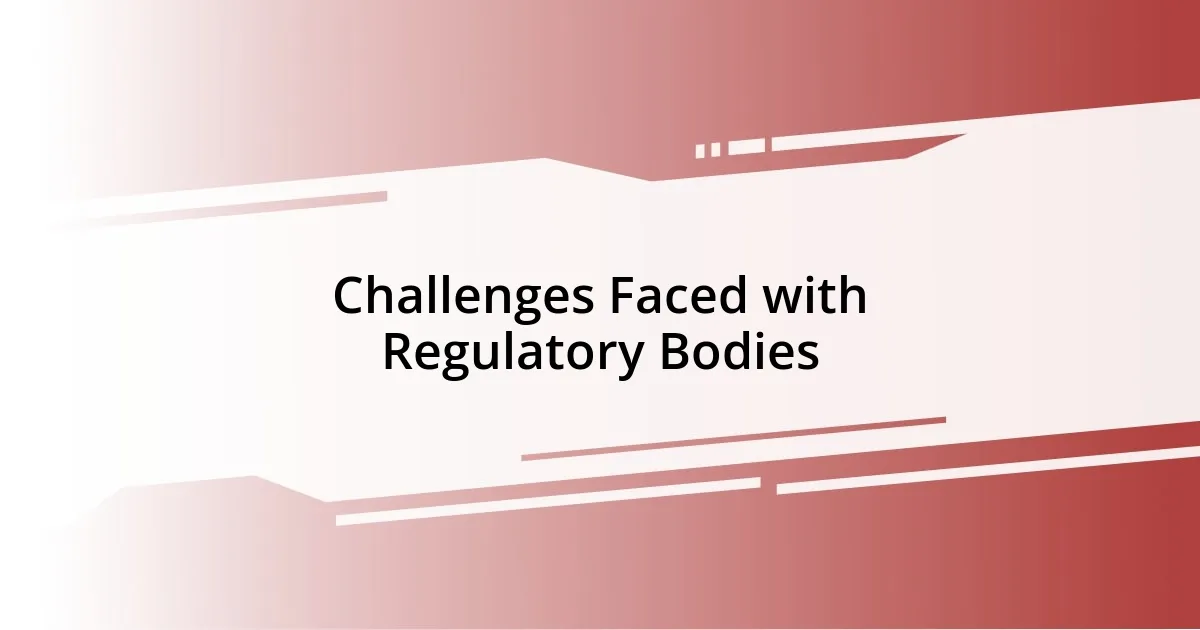
Challenges Faced with Regulatory Bodies
It’s no secret that working with regulatory bodies can be challenging. One of the most significant hurdles I faced was the sheer volume of documentation required. I remember dreading a particular audit where I was tasked with compiling an extensive dossier of compliance records. Have you ever felt overwhelmed by paperwork? In retrospect, that experience taught me the importance of precise documentation practices early on. Once I streamlined my processes, everything became far less daunting.
Another challenge was navigating conflicting interpretations of regulations. I often found myself in meetings where different departments had opposing views on compliance requirements. It felt like being caught in the middle of a tug-of-war. How could I possibly harmonize these perspectives? I eventually learned that open discussions led to collaborative solutions. Creating a safe space for dialogue allowed us to clarify our positions and work towards a unified approach.
Perhaps one of the hardest lessons I encountered was dealing with the unpredictability of regulatory changes. Just when I thought I had everything mapped out, new guidelines came into play, leaving me scrambling to adapt. I vividly remember receiving a notification on a Friday that revised a crucial policy we were planning to implement. It was daunting to rethink our strategy over the weekend! How do you tackle such sudden changes without feeling defeated? In my experience, fostering a flexible mindset has been essential. Accepting the inevitability of change enables me to pivot and find new pathways forward, rather than being overwhelmed by the obstacles.
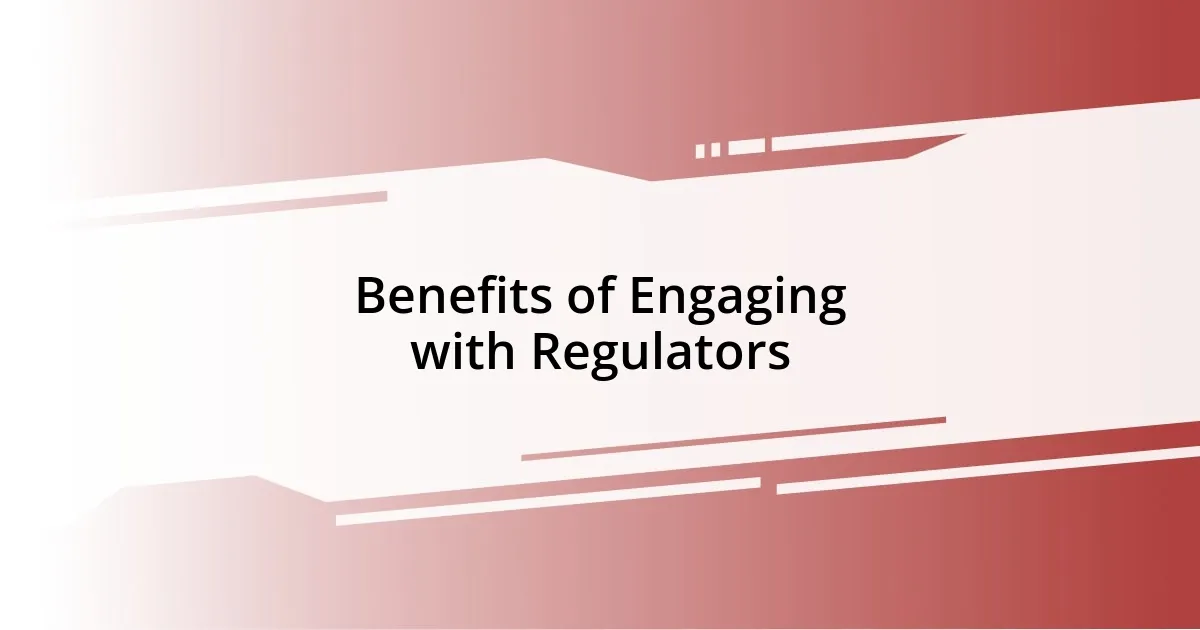
Benefits of Engaging with Regulators
Engaging with regulatory bodies has opened doors for me that I never anticipated. I recall attending a workshop hosted by regulators that offered not just insights but valuable networking opportunities. The experience was eye-opening; I realized that building relationships with regulators provides a platform to share concerns and suggestions, which can significantly influence future policies. Have you ever felt the power of a well-timed conversation? I certainly did when a casual chat led to an unexpected invitation to participate in a regulatory roundtable.
Another noteworthy benefit has been the clarity that comes from these interactions. In the past, I would often wade through dense regulatory language, feeling lost and uncertain. However, after engaging with regulatory representatives, I gained a clearer understanding of compliance obligations. For instance, during a Q&A session, I learned about a specific loophole that enhanced our operational efficiency without compromising compliance. It felt like unlocking a new level in a game I had been playing blindly!
The support system this engagement fosters is invaluable, too. I still remember a moment of sheer panic when our team faced a tight deadline for a new regulation rollout. I reached out to a contact at the regulatory body, who not only provided guidance but also expedited our compliance review process. The relief I felt when we received the necessary approvals was profound. Have you had moments where a simple connection turned a stressful situation into success? Those experiences reinforce my belief that proactive communication with regulators is a game-changer in navigating the often tumultuous waters of compliance.

Lessons Learned for Future Interactions
One critical lesson I’ve learned about future interactions with regulatory bodies is the importance of building trust through transparency. I once navigated a tense situation where our team was questioned about inconsistencies in our reports. It was nerve-wracking, but I chose to be upfront about our mistakes rather than trying to cover them up. Surprisingly, this honesty led to constructive feedback, and I realized that regulators appreciate when you acknowledge imperfections. Have you ever found that genuine communication paves the way for collaboration? It certainly did in my case.
I also discovered the value of preparing for meetings by thoroughly researching the regulatory landscape ahead of time. I vividly remember walking into a quarterly update meeting feeling unprepared, only to have knowledgeable regulators throw terms around that left me flustered. The anxiety I felt in that moment was a wake-up call; since then, I’ve committed to understanding emerging trends and regulations. This preparation transformed my approach; now I engage more confidently, and it’s like stepping onto a stage where I know my lines.
Lastly, I’ve come to appreciate the significance of post-interaction reflections. After each meeting or training session, I take time to jot down what went well and what could be improved. This practice not only solidifies my learning but also clears up any lingering questions I might have overlooked. Have you ever thought about how self-reflection enhances your future performances? The lessons gained from these reflections have guided me in shaping more productive interactions in subsequent meetings, fostering a continuous improvement mindset that’s invaluable for collaboration with regulatory bodies.












